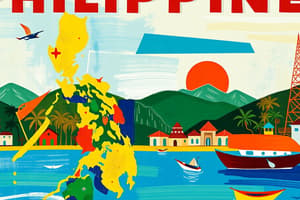Podcast
Questions and Answers
What is the Philippine archipelago composed of?
What is the Philippine archipelago composed of?
- Over 7,600 islands, including Luzon (correct)
- Only the islands of Luzon and Mindanao
- Only the islands of Luzon and Visayas
- Only the island of Luzon
What is the extent of the territorial sea of the Philippines?
What is the extent of the territorial sea of the Philippines?
- A strip of water that extends 50 nautical miles from the baselines of the national territory
- A strip of water that extends 20 nautical miles from the baselines of the national territory
- A strip of water that extends 100 nautical miles from the baselines of the national territory
- A strip of water that extends 12 nautical miles from the baselines of the national territory (correct)
What is the seabed?
What is the seabed?
- The land underwater, excluding mineral and natural resources
- The land underneath the national territory
- The land above the surface soil
- The land that holds the sea, including mineral and natural resources (correct)
What is included in the aerial domain of the Philippines?
What is included in the aerial domain of the Philippines?
What is the difference between sovereignty and jurisdiction?
What is the difference between sovereignty and jurisdiction?
What is the Benham Rise?
What is the Benham Rise?
What is the national territory of the Philippines composed of?
What is the national territory of the Philippines composed of?
How many islands are there in the Philippine archipelago?
How many islands are there in the Philippine archipelago?
What is the term 'archipelago' derived from?
What is the term 'archipelago' derived from?
Which of the following is NOT part of the national territory of the Philippines?
Which of the following is NOT part of the national territory of the Philippines?
What is the location of the Philippine archipelago?
What is the location of the Philippine archipelago?
What is the national territory defined as in the 1987 Constitution of the Philippines?
What is the national territory defined as in the 1987 Constitution of the Philippines?
Flashcards are hidden until you start studying
Study Notes
National Territory of the Philippines
- The national territory comprises the Philippine archipelago, including all islands and waters, and other territories over which the Philippines has sovereignty or jurisdiction.
- The archipelago is situated in the western Pacific Ocean, bordered by the South China Sea to the west, the Philippine Sea to the east, and the Celebes Sea to the south.
Components of the National Territory
- The Philippine Archipelago, with all the islands and waters embraced therein.
- All other territories over which the Philippines has sovereignty or jurisdiction.
- Its terrestrial, fluvial, and aerial domains.
- Its territorial sea, the seabed, the subsoil, the insular shelves, and other submarine areas.
- The waters around, between, and connecting the islands of the archipelago.
Key Features of the National Territory
- The archipelago is made up of over 7,600 islands, including Luzon, the largest island in the country.
- The territorial sea of the Philippines is a strip of water that extends 12 nautical miles from the baselines of the national territory.
- The seabed refers to the land that holds the sea, lying beyond the seashore, including mineral and natural resources.
- The subsoil refers to everything beneath the surface soil and the seabed, including mineral and natural resources.
- Insular shelves are the submerged portions of a continent or offshore island, which slope gently seaward from the low waterline.
Other Territories
- The Philippines also has sovereignty or jurisdiction over other territories, including the Kalayaan Island Group (Spratly Islands) and the Scarborough Shoal.
- The Philippines claims the Benham Rise, a submarine area located in the western Pacific Ocean.
Domains of the Philippines
- The terrestrial domain includes all land areas within the national territory.
- The fluvial domain includes all rivers, streams, and other bodies of water within the national territory.
- The aerial domain includes all airspace above the national territory.
Sovereignty and Jurisdiction
- Sovereignty is the supreme political and constitutional authority of a State to govern itself.
- Jurisdiction is the official power to make legal decisions and judgments.
Studying That Suits You
Use AI to generate personalized quizzes and flashcards to suit your learning preferences.




